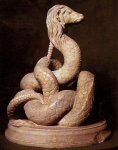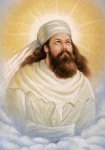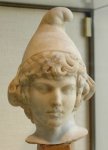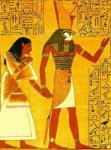10 Christ-like Figures Who Pre-Date Jesus
I recently watched the documentary Zeitgeist (Part 1) as well as Bill Maher’s movie Religulous. Both made mention of claims often made that there are many stories that predate Jesus but have striking parallels. I decided to follow up on these claims and see what kind of information was out there to substantiate these assertions.
I found several websites run by Christians who obviously disputed all claims of any parallels to the life of Jesus. I also found several interesting books on the subject, such as The World’s Sixteen Crucified Saviors: Christianity Before Christ by Kersey Graves, and The Christ Conspiracy, and Suns of God: Krishna, Buddha and Christ Unveiled by Acharya S.
As a non-christian, I am approaching this topic purely as an interested observer. I am assuming half of the people who read this will automatically say the claims are false and the other half will say they are true. The truth I found is that it is difficult to know for sure.
Here are ten of the figures often sited:
10. Buddha
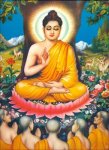
Both went to their temples at the age of twelve, where they are said to have astonished all with their wisdom. Both supposedly fasted in solitude for a long time: Buddha for forty–seven days and Jesus for forty. Both wandered to a fig tree at the conclusion of their fasts. Both were about the same age when they began their public ministry:
“When he [Buddha] went again to the garden he saw a monk who was calm, tranquil, self–possessed, serene, and dignified. The prince, determined to become such a monk, was led to make the great renunciation. At the time he was twenty–nine years of age… “Jesus, when he began his ministry, was about thirty years of age.” (Luke 3:23). Both were tempted by the “devil” at the beginning of their ministry: To Buddha, he said: “Go not forth to adopt a religious life but return to your kingdom, and in seven days you shall become emperor of the world, riding over the four continents.” To Jesus, he said: “All these [kingdoms of the world] I will give you, if you fall down and worship me” (Matthew 4:9). Buddha answered the “devil”: “Get you away from me.”
Jesus responded: “…begone, Satan!” (Matthew 4:10). Both strove to establish a kingdom of heaven on earth. According to the Somadeva (a Buddhist holy book), a Buddhist ascetic’s eye once offended him, so he plucked it out and cast it away. Jesus said: “If your right eye causes you to sin, pluck it out, and throw it away;.” (Matthew 5:29).
9. Krishna
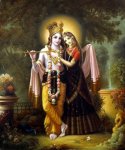
According to Bhagavata Purana some believe that Krishna was born without a sexual union, by “mental transmission” from the mind of Vasudeva into the womb of Devaki, his mother. Christ and Krishna were called both God and the Son of God. Both were sent from heaven to earth in the form of a man. Both were called Savior, and the second person of the Trinity. Krishna’s adoptive human father was also a carpenter. A spirit or ghost was their actual father. Krishna and Jesus were of royal descent. Both were visited at birth by wise men and shepherds, guided by a star. Angels in both cases issued a warning that the local dictator planned to kill the baby and had issued a decree for his assassination. The parents fled. Mary and Joseph stayed in Muturea; Krishna’s parents stayed in Mathura. Both Christ and Krishna withdrew to the wilderness as adults, and fasted. Both were identified as “the seed of the woman bruising the serpent’s head.” Jesus was called “the lion of the tribe of Judah.” Krishna was called “the lion of the tribe of Saki.” Both claimed: “I am the Resurrection.” Both were “without sin.” Both were god-men: being considered both human and divine. Both performed many miracles, including the healing of disease. One of the first miracles that both performed was to make a leper whole. Each cured “all manner of diseases.” Both cast out indwelling demons, and raised the dead. Both selected disciples to spread his teachings. Both were meek, and merciful. Both were criticized for associating with sinners. Both celebrated a last supper. Both forgave his enemies. Both were crucified and both were resurrected.
8. Odysseus
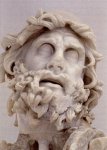
Homeric tales about Odysseus emphasize his suffering life, just as in Mark Jesus said that he, too, would suffer greatly. Odysseus is a carpenter like Jesus, and he wants to return his home just as Jesus wants to be welcomed in his native home and later to God’s home in Jerusalem. Odysseus is plagued with unfaithful and dim-witted companions who display tragic flaws. They stupidly open a magic bag of wind while Odysseus sleeps and release terrible tempests which prevent their return home. These sailors are comparable to Jesus’ disciples, who disbelieve Jesus, ask foolish questions, and show general ignorance about everything. It’s amazing that either Odysseus or Jesus ever manage to accomplish anything, given the companions they have, but this simply demonstrates the power and ability of the one true leader who has a divine mandate to lead the people out of darkness and into a brighter future.
7. Romulus
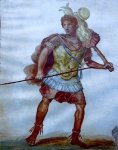
Romulus is born of a vestal virgin, which was a priestess of the hearth god Vesta sworn to celibacy. His mother claims that the divine impregnated her, yet this is not believed by the King. Romulus and his twin brother, Remus, are tossed in the river and left for dead. (A “slaughter of the innocents” tale which parallels that of Matthew 2:13-16). Romulus is hailed as the son of god. He is “snatched away to heaven” by a whirlwind (It is assumed that the gods took him), and he makes post mortem appearances. In his work Numa Pompilius, Plutarch records that there was a darkness covering the earth before his death (Just as there was during Jesus’ death according to Mark 15:33). He also states that Romulus is to be know afterwards as ‘Quirinus’; A god which belonged to the Archiac Triad (a “triple deity” similar to the concept of the Trinity).
6. Dionysus
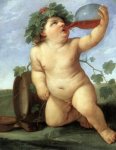
Dionysus was born of a virgin on December 25 and, as the Holy Child, was placed in a manger. He was a traveling teacher who performed miracles. He “rode in a triumphal procession on an ass.” He was a sacred king killed and eaten in an eucharistic ritual for fecundity and purification. Dionysus rose from the dead on March 25. He was the God of the Vine, and turned water into wine. He was called “King of Kings” and “God of Gods.” He was considered the “Only Begotten Son,” Savior,” “Redeemer,” “Sin Bearer,” Anointed One,” and the “Alpha and Omega.” He was identified with the Ram or Lamb. His sacrificial title of “Dendrites” or “Young Man of the Tree” intimates he was hung on a tree or crucified.







